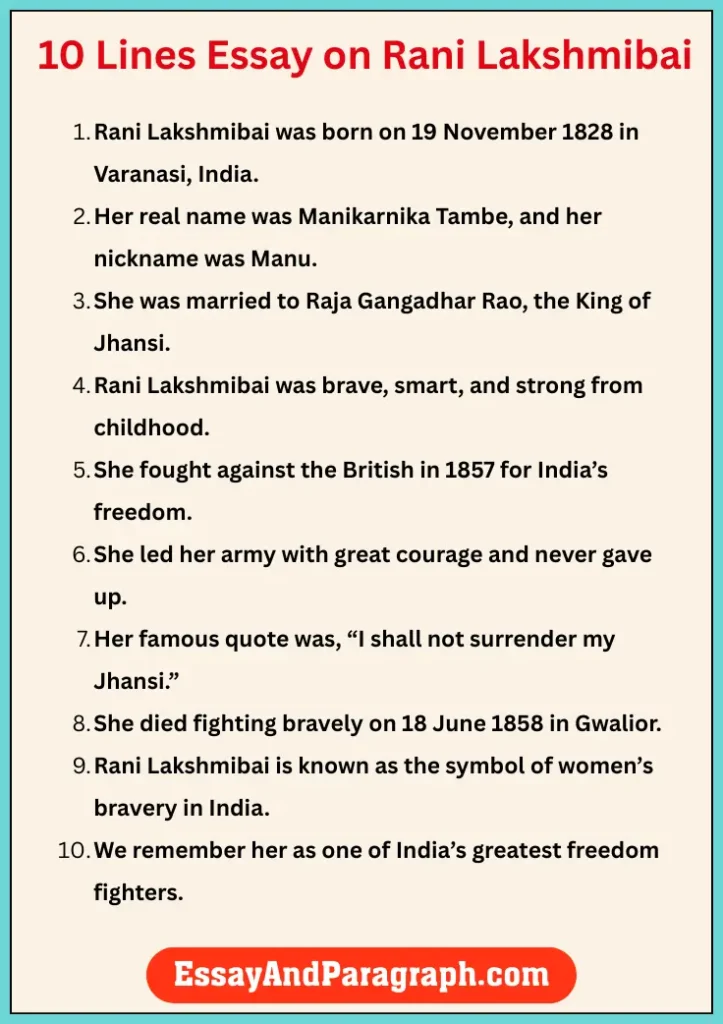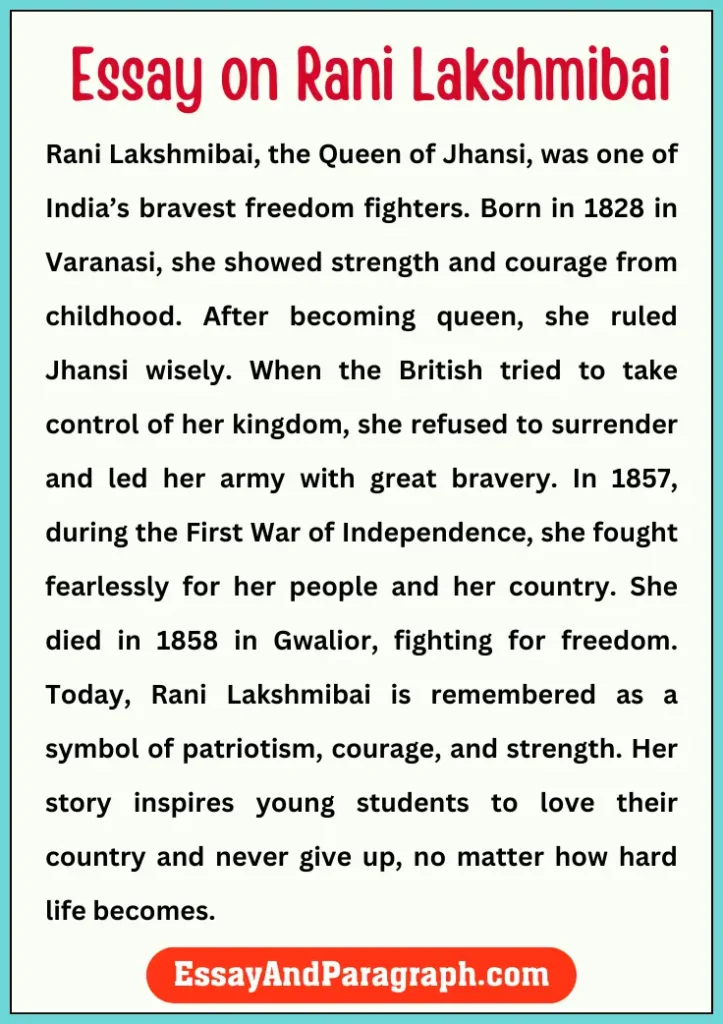Have you ever heard of a queen who fought bravely for her country with a sword in her hand? That fearless queen was Rani Lakshmibai, also known as the Queen of Jhansi. She was one of the greatest freedom fighters in Indian history, remembered for her courage and love for her motherland. Born in 1828 in Varanasi, India, she became a symbol of bravery and determination. In this article, we will learn how to write an essay on Rani Lakshmibai and understand why she is still remembered as the hero of India’s freedom struggle.
10 Lines Essay on Rani Lakshmibai
Rani Lakshmibai was born on 19 November 1828 in Varanasi, India.
Her real name was Manikarnika Tambe, and her nickname was Manu.
She was married to Raja Gangadhar Rao, the King of Jhansi.
Rani Lakshmibai was brave, smart, and strong from childhood.
She fought against the British in 1857 for India’s freedom.
She led her army with great courage and never gave up.
Her famous quote was, “I shall not surrender my Jhansi.”
She died fighting bravely on 18 June 1858 in Gwalior.
Rani Lakshmibai is known as the symbol of women’s bravery in India.
We remember her as one of India’s greatest freedom fighters.

Essay on Rani Lakshmibai – 100 Words
Rani Lakshmibai, the Queen of Jhansi, was one of India’s bravest women. She was born on 19 November 1828 in Varanasi. Her real name was Manikarnika Tambe. After marrying Raja Gangadhar Rao, she became the queen of Jhansi. When the British tried to take over her kingdom, she decided to fight back. Rani Lakshmibai dressed as a soldier, led her army, and fought for her land. She showed courage, strength, and love for her country. Even though she died in battle in 1858, her bravery still inspires people today. Rani Lakshmibai will always be remembered as a national hero.
Essay on Rani Lakshmibai – 150 Words
Rani Lakshmibai, the brave Queen of Jhansi, was one of India’s greatest freedom fighters. She was born on 19 November 1828 in Varanasi, Uttar Pradesh. Her real name was Manikarnika Tambe, and she was known as “Manu” in her childhood. After marrying Raja Gangadhar Rao, she became the queen of Jhansi. When the British tried to take over her kingdom, she refused to surrender and chose to fight for her land. In 1857, during the First War of Independence, she led her army with great courage and fought till her last breath in Gwalior on 18 June 1858. She became a symbol of bravery and patriotism. Today, Rani Lakshmibai is remembered as a fearless leader who proved that women are strong, determined, and capable of defending their nation. Her courage continues to inspire millions across India.
Essay on Rani Lakshmibai – 200 Words
Rani Lakshmibai was one of the most courageous women in Indian history. She was born on 19 November 1828 in Varanasi, Uttar Pradesh. Her father, Moropant Tambe, was a court advisor, and her mother, Bhagirathi, taught her values of bravery. From a young age, she learned horse riding, sword fighting, and archery.
She married Raja Gangadhar Rao of Jhansi and became the queen. After her husband’s death, the British East India Company tried to take her kingdom under the Doctrine of Lapse. Rani Lakshmibai refused to give up Jhansi and decided to fight for her land.
In 1857, during India’s first war of independence, she led her army with great courage. Her leadership and bravery made her a symbol of freedom and woman power. She died in 1858 while fighting in Gwalior. Her story still inspires millions to love and protect their country.
Short Essay on Rani Lakshmibai – 250 Words
Rani Lakshmibai, also known as the Queen of Jhansi, was a great freedom fighter and one of India’s most admired heroines. She was born in 1828 in Varanasi, a city with a population of over 1.2 million today. Her childhood name was Manikarnika, and she was lovingly called Manu. She learned horse riding and sword fighting, which were unusual for girls of that time.
When she became the queen of Jhansi after marrying Raja Gangadhar Rao, she ruled with kindness and wisdom. But after her husband’s death, the British tried to take control of Jhansi under unfair laws. Rani Lakshmibai refused to accept this and said, “I will not give up my Jhansi.”
She led her army in the Revolt of 1857, showing great strength and leadership. Even though she had a small army compared to the British, she fought bravely till her last breath in Gwalior in 1858.
Rani Lakshmibai’s courage, patriotism, and leadership made her a national icon. Her statue stands tall in Jhansi, reminding everyone of her fearless spirit. She proved that true love for the nation has no limits.
Long Essay on Rani Lakshmibai – 500 Words
Rani Lakshmibai of Jhansi is remembered as one of the bravest women in Indian history. She played a key role in the First War of Independence in 1857 and became a symbol of courage and resistance.
She was born on 19 November 1828 in Varanasi, a historic city along the Ganges River. Her father, Moropant Tambe, worked for the Peshwa of Bithoor, near Kanpur. Growing up in a progressive environment, young Manikarnika, or “Manu,” learned to ride horses, handle weapons, and practice self-defense—skills that were rare for girls at that time.
In 1842, she married Raja Gangadhar Rao, the ruler of Jhansi, a city located in present-day Uttar Pradesh. After his death, the British East India Company refused to recognize her adopted son as the heir and annexed Jhansi under the Doctrine of Lapse. This injustice made Rani Lakshmibai determined to fight back.
When the Revolt of 1857 began, she led her troops with unmatched bravery. Dressed as a soldier, she fought fiercely against the British forces. Even though her army was smaller, her leadership inspired thousands. Historical sources say she rode into battle with her young son tied to her back—a symbol of true courage and sacrifice.
She fought her final battle in Gwalior in June 1858, where she died at the age of 29. Her sacrifice left a deep mark on India’s struggle for freedom. Today, Jhansi has become a symbol of women’s strength and patriotism, with monuments, schools, and roads named after her.
Rani Lakshmibai’s story teaches us that courage, love for one’s country, and determination can make anyone a hero. She remains an inspiration for all generations, reminding us that true bravery is standing up for what is right, no matter the cost.
Top 5 Quotes on Rani Lakshmibai
“I shall not surrender my Jhansi.” – Rani Lakshmibai
“Rani Lakshmibai was the bravest and best leader of the rebels.” – British Officer Hugh Rose
“Her name will be written in golden letters in Indian history.” – Jawaharlal Nehru
“Bravery knows no gender, and Rani Lakshmibai proved it.” – Anonymous
“She was the flame that lit the fire of India’s freedom.” – Lokmanya Tilak
FAQs on Rani Lakshmibai
1. Who was Rani Lakshmibai?
Rani Lakshmibai was the Queen of Jhansi and one of India’s greatest freedom fighters. She was born in 1828 and became famous for fighting against British rule during the Revolt of 1857.
2. Why is Rani Lakshmibai famous?
She is famous for her bravery and leadership. Even when facing a powerful British army, she fought fearlessly to protect Jhansi and her people.
3. When and where was Rani Lakshmibai born?
She was born on 19 November 1828 in Varanasi, Uttar Pradesh, India.
4. What was Rani Lakshmibai’s real name?
Her real name was Manikarnika Tambe. People lovingly called her Manu before she became the Queen of Jhansi.
5. How did Rani Lakshmibai die?
She died on 18 June 1858 in Gwalior while fighting the British army. She was only 29 years old but fought till her last breath.
6. Why is Rani Lakshmibai important in Indian history?
She became a symbol of courage and patriotism. Her fight inspired many others to join India’s freedom movement and continues to motivate people even today.

Summary of Rani Lakshmibai
Rani Lakshmibai, the Queen of Jhansi, was one of India’s bravest freedom fighters. Born in 1828 in Varanasi, she showed strength and courage from childhood. After becoming queen, she ruled Jhansi wisely. When the British tried to take control of her kingdom, she refused to surrender and led her army with great bravery. In 1857, during the First War of Independence, she fought fearlessly for her people and her country. She died in 1858 in Gwalior, fighting for freedom. Today, Rani Lakshmibai is remembered as a symbol of patriotism, courage, and strength. Her story inspires young students to love their country and never give up, no matter how hard life becomes.

